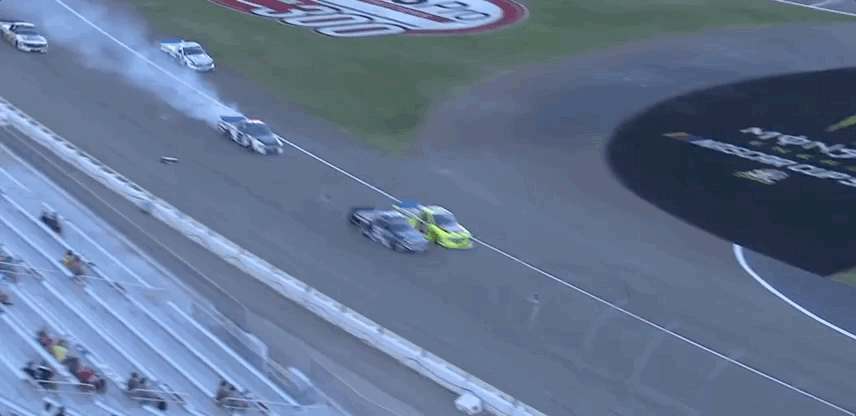NASCAR Denies Truck Team's Request For Reinstatement Into Playoffs After Spec Engine Failures
After NASCAR Truck Series team Thorsport Racing had three out of four drivers sidelined from a cutoff race in the series' elimination playoffs by virtue of spec engine issues, eliminating two of the drivers from playoff contention, the team publicly disavowed blame and asked for NASCAR to reinstate them. NASCAR has denied the request.
NASCAR confirmed the reports of its decision to Jalopnik on Friday, saying, "NASCAR has declined ThorSport Racing's request" and nothing more.
The request came after Thorsport teammates Johnny Sauter and Grant Enfinger, who won the Truck Series' regular-season title, were cut after the first of three rounds of the series' elimination playoffs. Their eliminations ultimately came at the hands of terminal engine issues at Las Vegas Motor Speedway in September, the final race of the first round.
Their other teammates, Matt Crafton and Ben Rhodes, also had engine issues. Crafton was taken out of the race early as well but managed to squeeze into the next round on points, and Rhodes, who didn't make the playoffs, finished the race but his truck had signs of damage when evaluated later.
Thorsport was vocal after it happened, and for good reason. The team runs the Truck Series' spec engine called the NT1, manufactured by Ilmor Engineering and essentially forced upon the field due to regulations that made the surviving OEM option uncompetitive, and put the blame on Ilmor for the issues. The NT1 is a derivative of the Ilmor 396 spec V8, and the series moved to it in recent years as a cost-cutting measure.
Failures on a spec part shouldn't drop a team out of contention, Thorsport team manager David Pepper argued, saying NASCAR should reinstate the team into its playoffs. The playoffs span seven races and eight drivers, eliminating two after the first "round" of three races, two more after the second, and leaving four to race for the title in the final event of the year at Homestead-Miami Speedway, where the highest playoff finisher wins the title. After each round, points are essentially reset and remaining playoff drivers start on an almost even field.
The first two drivers eliminated after the first round this year were, of course, Sauter and Enfinger.
Pepper didn't want a redo or a points shuffle; he simply wanted NASCAR to put his two drivers back into contention and still take four to Miami.
"We would like to see a little more done from our partners at NASCAR," Pepper said. "From our standpoint, where we've been eliminated from the playoffs and it was none of our doing, and what we're asking and lobbying at this point is, we don't want a reset or a reshuffle. We'd like to go to Talladega and the next three races and be allowed to be back into the playoffs.
"Eliminate four teams at Phoenix, and we'll take our last-place finishes at Las Vegas, and allow our teams to race and compete."
Both Autoweek and NBC Sports reported that Thorsport sent a letter to NASCAR in order to formalize the request (Thorsport didn't respond to Jalopnik's request for comment last week when asked if the team had formalized its request), but it wasn't meant to be this year. NASCAR denied it, and from Thorsport, Crafton is officially the only remaining playoff driver.
The situation says a lot about the inherent problems that come with spec parts, with Enfinger tweeting before the reinstatement denial that Ilmor "can and has built great engines, but with no competition, they win regardless," alleviating the manufacturer's accountability to improve. (Jalopnik asked Ilmor its response to this and Enfinger's other comments last week, but didn't hear back.)
But it almost says more about the NASCAR playoffs themselves, and how, in a practical sense, they're far less legitimate in terms of deciding the real winners in a season. Consistency over many races won Enfinger the regular-season title, but one mechanical problem knocked him out of the championship weeks later, simply because the playoffs eliminate after short spurts of three races.
In racing—both how many other series work and how NASCAR used to—crashes and mechanical issues can be made up for across a season due to points padding earned by consistently successful drivers. In a sport where crashes and failures happen, the opportunity to earn that padding is a must.
In the playoffs, with points resetting every few races and eliminations soon after, one unexpected ailment can be the end for a driver—even if it was the fault of a spec part, and even if that driver had a successful year before then.
But that's the nature of modern NASCAR, as hard to legitimize as it might be, and it doesn't sound like modern NASCAR will be changing anytime soon.
